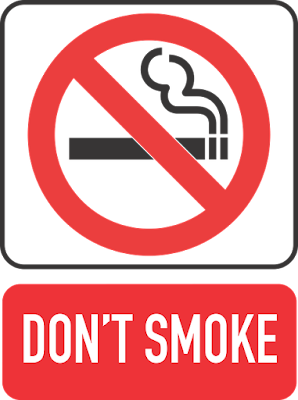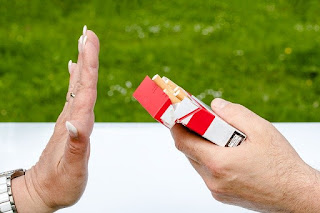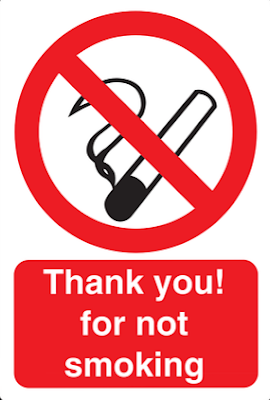Smoking
 |
| Image source - pixabay |
The process of taking tobacco in the form of a cigarette is called smoking. It is a bad habit and is injuries to health. It becomes a habit when we take such things regularly. The harmful chemical object present in tobacco is nicotine. It shows it's effect slowly on the lungs and throat. Smoking for a long time may cause TV, cancer, heart disease, respiratory problems etc.
We can see many people in our community smoking. Boys have involved more in smoking then the girls. The traditional way of smoking is tamakhu (Tobacco). Usually, old people smoke tamakhu (Tobacco). Nowadays, young people are found involved more in smoking.
Smoking not only affects the smokers but also the people who are around them. Passive smokers are the person sitting near or around smokers. Most of the people start smoking under the influence of their friends. Children of smoking parents learnt to smoke from their parents.
It is very difficult to quit the habit of smoking. Smokers have a bad smell. Their teeth, lip, tongue and skin are seen black. They may suffer from coughing. We have to suggest the people who smoke to quit this habit. We should not copy such a bad habit. we should inform the people who smoke about the harmful effects of smoking. We should raise public awareness in the community that smoking is injurious to health.
We can see many people in our community smoking. Boys have involved more in smoking then the girls. The traditional way of smoking is tamakhu (Tobacco). Usually, old people smoke tamakhu (Tobacco). Nowadays, young people are found involved more in smoking.
Smoking not only affects the smokers but also the people who are around them. Passive smokers are the person sitting near or around smokers. Most of the people start smoking under the influence of their friends. Children of smoking parents learnt to smoke from their parents.
It is very difficult to quit the habit of smoking. Smokers have a bad smell. Their teeth, lip, tongue and skin are seen black. They may suffer from coughing. We have to suggest the people who smoke to quit this habit. We should not copy such a bad habit. we should inform the people who smoke about the harmful effects of smoking. We should raise public awareness in the community that smoking is injurious to health.
How to quit smoking?
 |
| Image source - pixabay |
We all know the health risks of smoking, but there is no easy way to break the habit. Whether you smoke as a teenager or a lifelong smoker, quitting can be really hard. Smoking is both a physical addiction and a mental habit. Cigarettes provide high levels of nicotine to the body. Removing regular nicotine fixes can cause your body to experience physical withdrawal symptoms and cravings. Because nicotine makes your brain feel good, you want to turn to cigarettes as a quick and reliable way to boost your vision, reduce stress, and get involved. Smoking can also be a way for people to cope with depression, anxiety or boredom. Abandonment means finding different healthy ways to deal with different emotions.
Smoking is also considered a daily ritual. This can be an automated response to your morning coffee with smoking, at work or at school, or after the day's work. Or it could be that your friends, family, or co-workers smoke, and you want to be a part of them. To successfully quit smoking you need to address both addiction and its habits and routines. But it can certainly be done.
Smoking is also considered a daily ritual. This can be an automated response to your morning coffee with smoking, at work or at school, or after the day's work. Or it could be that your friends, family, or co-workers smoke, and you want to be a part of them. To successfully quit smoking you need to address both addiction and its habits and routines. But it can certainly be done.
Here, we have 14 ways how to quit smoking:
- Pick a date for the next two weeks, so that you can take enough time to prepare without losing your motivation. If you smoke especially at work, quitting on the weekends will make it easier for you to adjust to the change.
- Tell your friends and family about your smoking cessation plan and that you need their support and encouragement to stop smoking. Find a friend who want helps to quit smoking. You can help each other quit smoking for a while.
- Many people start smoking again within the first three months after quitting. You can help yourself by preparing to quit smoking and cigarette cravings.
- Discard all cigarettes, lighters, ashtrays, and shells you have. Wash clothes and clean anything that smells like smoke, wash your car with shampoo, clean your drops and carpet, and clean your furniture thoroughly.
- Take time to think about how you used to smoke. Think about what moment in your life called you for a cigarette and why. It helps you identify what advice, techniques, or treatments to quit smoking may be beneficial to you.
- Medications can help curb the urge to smoke and can be satisfying instead of smoking if you pickup cigarettes. Other many drugs can ease withdrawal symptoms, such as depression or problems with concentration.
- One of the main reasons people smoke is because nicotine helps them relax. Once, you quit smoking you need new ways to relax. There are many options for that. You can exercise, listen to your favorite music, keep in touch with friends, enjoy a massage, or take time out for a hobby. The first week after quitting smoking, try to avoid stressful situations.
- When you drink alcohol, it becomes more difficult to achieve your goal of not smoking. So try to limit alcohol when you first stop smoking. Also, if you often smoke while drinking coffee, drink tea for a few weeks. If you usually smoke after meals, try something else, such as brushing your teeth, walking, talking to a friend or chewing gum.
- Throw away all your ashtrays and lighters once you have finished smoking your last cigarette. Wash any clothes that smell of smoke and clean your curtains and sofas. Use air fresheners to get rid of that smoke odor. Don't leave anything at home that reminds you of smoking.
- Many people try many times before quitting smoking forever but after a while they start again. If this happens to you, don't despair. Instead, think of these as actions that you should take on a regular basis. Use it as an opportunity to increase your commitment to quit smoking. Once you've decided to try quitting again, set a “drop date” within the next month.
- Being active in any activity can curb nicotine cravings and reduce some side effects. Light exercise can also help curb the urge to smoke, such as walking with a dog or watering a garden.
- When you quit smoking, don't try to diet too much. Instead, try to eat more fruits, green leafy vegetables, whole grains, and less protein. These all things are good for your whole body.
- Aside from all the health benefits, one of the benefits of quitting smoking is all the money you save. How rich you would feel if you calculated this. You can reward yourself by spending some of it on fun.
- Once you quit smoking, start taking immediate health benefits. After only 20 minutes, your heart rate returns to normal. Within a day, your blood carbon monoxide levels also fall back into place. In just 2 weeks, you will begin to reduce the chances of having a heart attack. In the long run, you will also be less likely to get lung cancer and other cancers.
Why important to quit smoking?
 |
| Image source - pixabay |
Cigarette smoke contains more than 4,000 chemicals. Of these, about 400 types of chemicals are harmful to our body, while about 70 types of chemicals are carcinogenic. The main chemical that makes a person addicted to smoking is nicotine. According to one study, just 60 milligrams of nicotine or about 10 milliliters of nicotine solution is enough to kill an adult. One cigarette causes the body to absorb about one milligram of nicotine. Within 10 to 20 seconds of smoking, a toxic chemical called nicotine travels through our bloodstream to the brain. In addition, chemicals including carbon monoxide, ammonia, formaldehyde, and hydrogen cyanide can cause heart and lung disease.
Studies show that as soon as you quit smoking, your body begins to try to recover from its effects, with the following 12 benefits:
- 20 minutes after quitting smoking, a person's blood pressure and heart rate return to normal as before smoking.
- After 12 hours, the level of toxic gas called carbon monoxide in the blood decreases and returns to normal.
- After 24 hours, high blood pressure comes under control due to which the risk of heart attack is reduced.
- 48 hours after, a toxic substance called 'nicotine' is completely excreted from the body.
- Within two weeks to three months, the blood circulation process and lung function improves.
- Within one to nine months, the fine hairs inside the trachea begin to produce phlegm.
- Due to which cough, shortness of breath and chest tightness gradually decreases and breathing becomes easier.
- After one year, the risk of coronary heart disease and heart attack is reduced.
- After five years, the risk of stroke and lung cancer is reduced and it becomes normal as a non-smoker.
- The risk of dying from lung cancer is reduced by 50 percent after 10 years.
- The risk of cancer of the trachea and pancreas is low.
- Quitting smoking increases eyesight and hearing, keeps mouth, teeth clean and healthy and also increases sexual ability.
 |
| Image source - pixabay |
Thanks for sharing helpful information ...
ReplyDeleteB.SC. final year Result 2020
Thanks for nice comment.
DeletePost a Comment